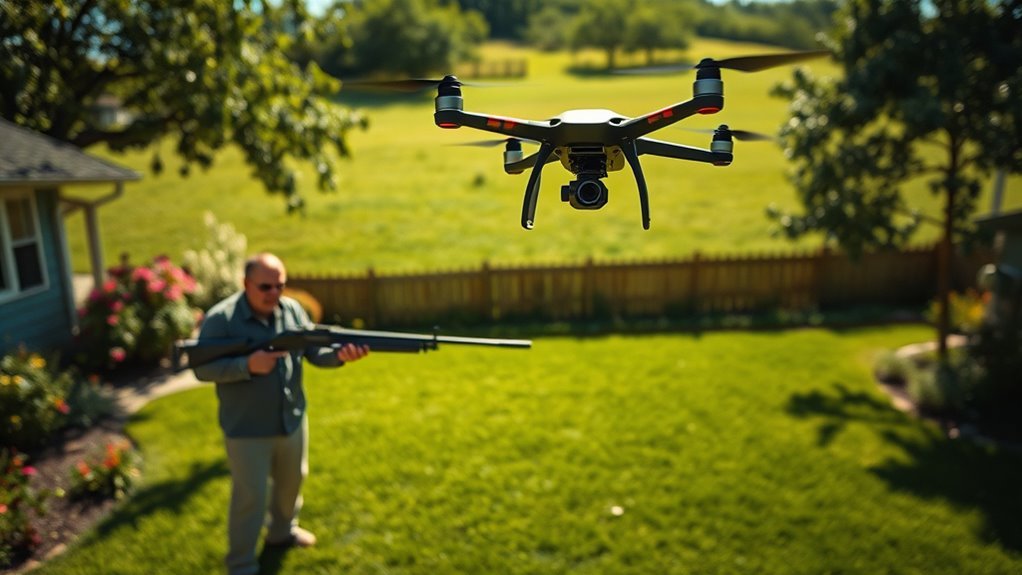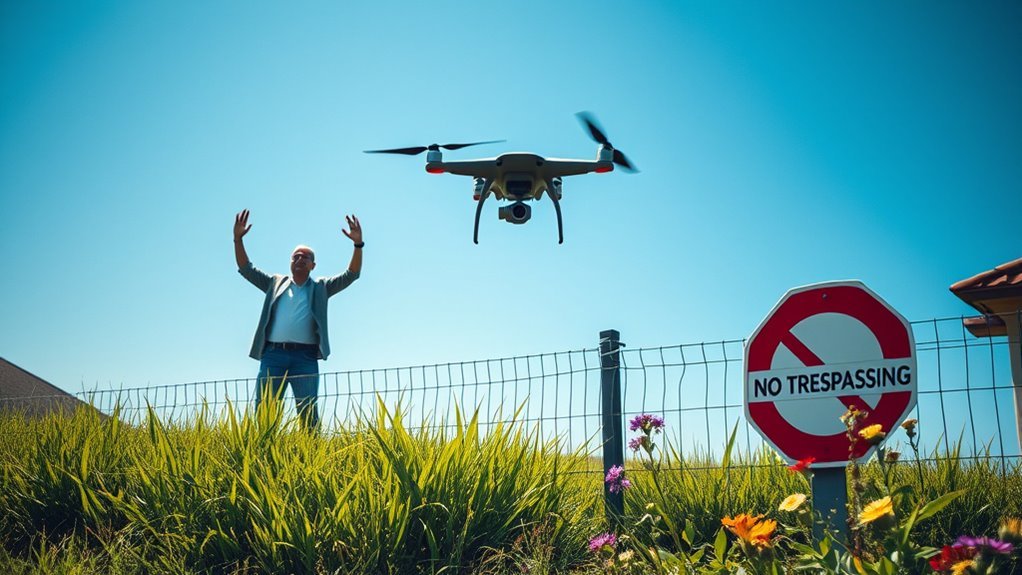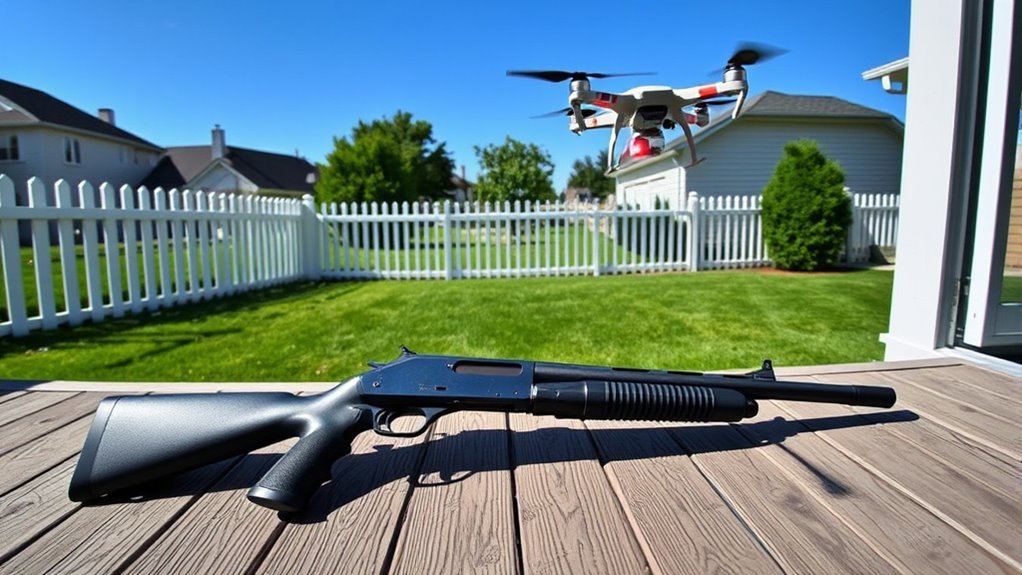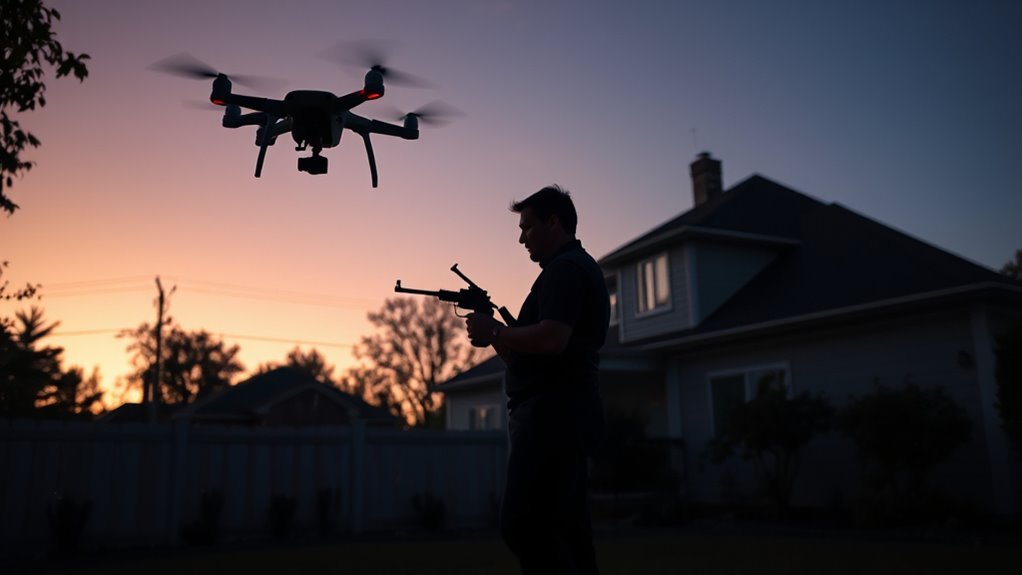If you shoot a drone on your property, you could face serious criminal charges since drones are federally protected as aircraft, making their destruction illegal. You might also be liable for civil damages, including costly lawsuits to cover repairs or replacement. Property rights don’t extend fully into controlled airspace, limiting your ability to take such actions. There are safer, lawful alternatives to address drone concerns. Understanding these legal boundaries is essential before taking any steps against drones.
Understanding Federal Laws Protecting Drones

Although drones have become increasingly common for both recreational and commercial use, federal laws strictly regulate how they can be treated, including prohibitions against shooting them down. You need to understand that federal regulations classify drones based on size, weight, and purpose, which directly impacts their legal protections. The FAA governs drone operation, enforcing rules that prioritize airspace safety and privacy. Shooting a drone is generally illegal, as it can be considered destruction of federal property or interference with aviation. These regulations exist to balance your freedom with public safety and airspace order. Recognizing the drone classification helps you grasp the extent of these protections and avoid actions that could lead to severe legal consequences. Knowing this framework empowers you to protect your rights responsibly without breaching federal law.
Property Rights Versus Airspace Rights

When you own property, you naturally expect to control what happens within its boundaries, but the rights you hold over the airspace above your land are limited by law. Property ownership grants you control over your land’s surface and immediate airspace, but federal regulations define navigable airspace beyond certain altitudes. Understanding these distinctions is vital:
- Airspace boundaries legally begin above the minimum altitude necessary for safe aircraft operation, limiting your control.
- Your property rights typically extend only to the immediate reaches above your land, not to the vast sky beyond.
- Drones operating within federally protected airspace often have legal precedence, complicating your ability to act against them.
Balancing your desire for freedom with these legal constraints requires careful consideration of how property ownership intersects with airspace rights.
Potential Criminal Consequences of Shooting a Drone

Since drones are considered aircraft under federal law, shooting one can lead to serious criminal charges. You might feel justified protecting your property, but damaging or destroying a drone risks violating federal statutes, including laws against interfering with aircraft. Even if you believe your actions are an exercise of self defense, courts often require clear, imminent threats to justify such force. Without concrete evidence that the drone posed a direct danger, criminal charges like destruction of government property or reckless endangerment can be pursued. It’s essential to recognize that your right to defend property doesn’t automatically extend to shooting down drones. Understanding these legal boundaries helps you protect your freedom responsibly without crossing into criminal liability.
Civil Liabilities and Lawsuits From Drone Damage
Shooting a drone can expose you to significant civil liabilities beyond criminal charges. When you take such action, you risk facing civil lawsuits from the drone owner seeking compensation. Here are key civil liability risks to regard:
- Property Damage Claims: The owner may sue for the drone’s repair or replacement costs if you damage their property.
- Breach of Privacy or Negligence: Even if the drone invades your privacy, damaging it can lead to complex legal disputes about rights and responsibilities.
- Drone Insurance Issues: Many drone operators carry drone insurance that covers losses from incidents like yours, making you a target for claims.
Understanding these factors is crucial if you value your freedom and want to avoid costly civil consequences.
Alternatives to Shooting Down a Drone on Your Property
Although it may be tempting to take immediate action against a drone invading your property, there are safer and legally sound alternatives you should consider first. Employing effective drone protection tactics guarantees your rights without risking legal consequences. Before resorting to shooting, explore options like notifying authorities or using anti-drone technology designed for legal drone removal.
| Alternative Method | Description | Legal Consideration |
|---|---|---|
| Contact Authorities | Report drone to local law enforcement | Guarantees official intervention |
| Signal Jamming Devices | Disrupts drone control signals | Restricted use; check regulations |
| Physical Barriers | Install nets or shields | Non-destructive, lawful defense |

